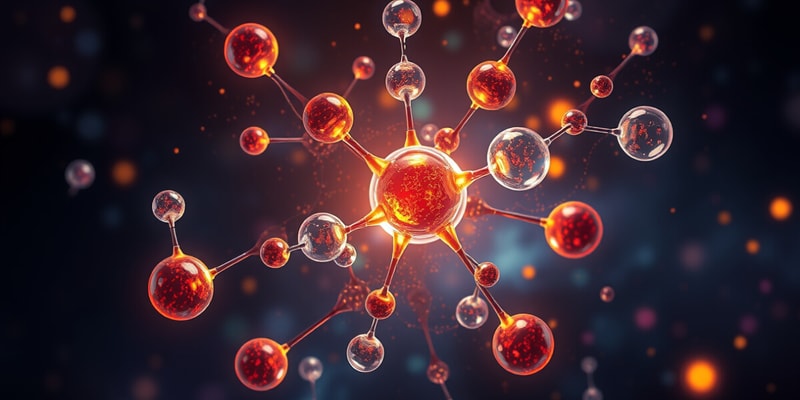Podcast
Questions and Answers
What is the primary focus of organic chemistry?
What is the primary focus of organic chemistry?
What is the purpose of covalent bonding in organic chemistry?
What is the purpose of covalent bonding in organic chemistry?
Which of the following is NOT a type of organic compound mentioned in the text?
Which of the following is NOT a type of organic compound mentioned in the text?
What is the primary use of alkanes found in fossil fuels?
What is the primary use of alkanes found in fossil fuels?
Signup and view all the answers
What is the relationship between alkanes and cycloalkanes?
What is the relationship between alkanes and cycloalkanes?
Signup and view all the answers
What is the role of functional groups in organic chemistry?
What is the role of functional groups in organic chemistry?
Signup and view all the answers
What type of reaction involves forming a double bond between two atoms by removing two atoms or ions?
What type of reaction involves forming a double bond between two atoms by removing two atoms or ions?
Signup and view all the answers
Why are benzene and its derivatives considered aromatic compounds?
Why are benzene and its derivatives considered aromatic compounds?
Signup and view all the answers
In organic chemistry, what does nucleophilic substitution involve?
In organic chemistry, what does nucleophilic substitution involve?
Signup and view all the answers
How do functional groups contribute to clarity in communication among scientists?
How do functional groups contribute to clarity in communication among scientists?
Signup and view all the answers
Study Notes
Organic Chemistry: Building with Molecular Legos
Organic chemistry is a subfield of chemistry that focuses on the study of carbon-based compounds. It is a fascinating area of research that involves the synthesis of complex structures through covalent bonding, the manipulation of organic molecules, and the analysis of their properties. In essence, organic chemistry is similar to playing with molecular Legos. Instead of constructing buildings and vehicles, chemists build intricate organic molecules with diverse structures and properties.
Understanding Organic Compounds
The backbone of organic chemistry lies in the element carbon, which forms covalent bonds with itself and other elements to create a vast array of structures. Organic compounds, such as alkanes, cycloalkanes, and benzene derivatives, are essential parts of everyday life. For example, alkanes found in fossil fuels power our cars, while aromatic compounds give our perfumes their distinctive scents.
Building Blocks: Alkanes and Cycloalkanes
Alkanes are hydrocarbons consisting of carbon (C) atoms connected by single bonds to one another and may be bonded to one or more hydrogen (H) atoms. They form a large class of organic compounds with unique properties that make them useful as energy sources. Cycloalkanes are alkane derivatives where the chain forms a ring structure. Both alkanes and cycloalkanes have significant applications in industries such as pharmaceuticals, plastics, and fuels.
Functional Groups: Naming the Molecules
To identify different types of organic compounds, chemists use various naming conventions based on the presence of functional groups, such as alcohols, ethers, sulfides, carboxylic acids, and their derivatives. These names follow specific rules to ensure consistency and clarity in communication among scientists.
Reactions: Substitution and Elimination
Organic chemistry involves understanding reactions like nucleophilic substitution and elimination. In a substitution reaction, an atom or group is replaced on a molecule, while elimination reactions involve the removal of two atoms or ions from a compound, forming a double bond between two other atoms.
Aromatic Compounds: Benzene and Derivatives
Benzene and its derivatives are aromatic compounds characterized by their distinct stability due to resonance structures. Aromaticity plays a crucial role in determining the reactivity and properties of these compounds, making them essential for the synthesis of many materials and pharmaceutical products.
In summary, organic chemistry is a captivating field that offers endless possibilities for creating complex molecular structures through careful manipulation of chemical bonds. It's not just about building with Legos; it's about constructing the foundation of our world using carbon-based compounds.
Studying That Suits You
Use AI to generate personalized quizzes and flashcards to suit your learning preferences.
Description
Explore the fundamental concepts of organic chemistry, from building intricate organic molecules to understanding substitution and elimination reactions. Learn about the significance of functional groups and aromatic compounds in the synthesis of materials and pharmaceutical products.




